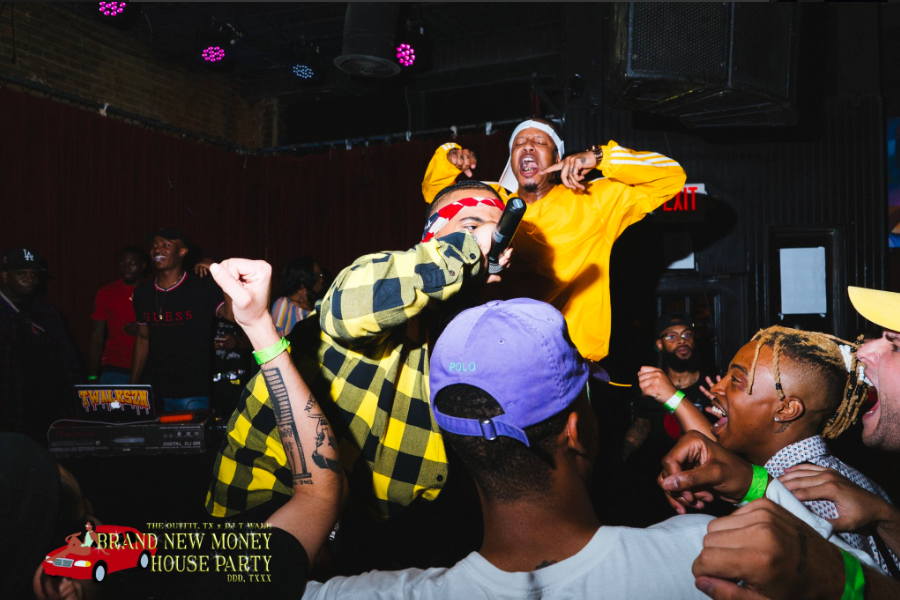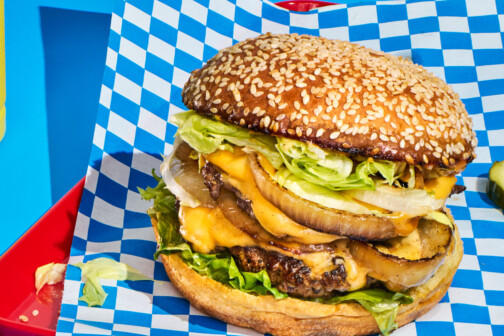Friday marked a little over a week since rapper-turned-DJ Blue, The Misfit tweeted that three prominent Deep Ellum bars had ordered DJs to not “play ‘turn up’ and ‘trap music’ on the weekends.’”
“Figured I’d spread the word for those of you that go down there for that,” he finished.
The bars—Independent Bar and Kitchen, Off the Record, and Club Dada—pack in hundreds of clubgoers each weekend, evenings often soundtracked by this brand of rap music. Within hours, Blue’s tweet seemed to have reached every marginally affected player in the Dallas DJ scene. Everyone from fellow selectors to unnamed extras shared their opinions and admonishments across Twitter and Facebook, detailing various perspectives of a nearly blockwide mandate that seemed to conspicuously target a specific demographic.
Screenshots surfaced of a user known only as “Gary” in the popular Deep Ellum Community Watch Facebook group. His post railed against “the gangsters and whores” attracted to Independent Bar & Kitchen by the “gangster/whore music on the street all night.” “Gary,” who claimed to be a business owner in Deep Ellum, listed his grievances: the music volume and content, IBK’s customers’ appearances, alleged drug dealing, and the impact all this has on his customers, his business’ revenue, and overall quality of life. (Neither Gary’s identity nor ties to any Deep Ellum establishment have been confirmed.)
This was the environment welcoming The Outfit, TX to Club Dada on Friday night for their annual Brand New Money party. The local rap group has gained national notoriety for their high-energy brand of trunk rattlers, the willfully abrasive cousins to the very sort of music that’s been at the center of Deep Ellum’s controversy. And in the face of the growing unease around the so-called trap ban, rappers Mel and Jayhawk and their DJ T Walk waded right in to promote the show: “Let’s show & prove that THEY CANT REMOVE THE REAL CULTURE FROM DEEP ELLUM,” they tweeted.
Early RSVPs sold out quickly. More than 300 people packed into the cramped Dada, according to numbers from the door count, watching as Mel played hypeman to whatever DJ T Walk had in rotation. JayHawk was as the every-rapper, carrying each trap anthem’s hook, verse, and adlibs. Travis Scott, Lil Uzi Vert, Sheck Wes, and BlocBoy JB blasted out of the speakers, all of which would’ve almost certainly been included in the ban. The Brand New Money crowd responded as they would at a house party. The thick, recycled air was the only space between the synchronized—and, on this Friday, perhaps radicalized—bodies of partygoers.
The man who’s stepped out in front of this controversy was around the corner at The Ruins, the restaurant-slash-bar-slash-live music venue, where Dallas expat Dezi 5 headlined an evening celebrating Pride Weekend. Moody Fuqua, who heads programming at the three bars, insisted that the thorn in the venues’ paws wasn’t any particular type of music, the content of the music, or who the music attracts. Fuqua said it wasn’t really a ban at all; it was intended to address crowd control. He said it was a way to ask the DJs to be more mindful of the energy created in the final hours of the parties at the venues.
How can the management team of these venues respond to increased pressure to maintain order in an entertainment district that is growing beyond expectations?
And yet: barring a particular type of music that tends to attract a crowd of young black men and women has triggered allegations of thinly-veiled racism. But Fuqua again insisted it was a matter of safety, and said he’s open to discussing it with any of the DJs.
Something has to be said about a too frequent post-midnight queue of “Head Bussa,” “Knuck If You Buck,” and “Tear Tha Club Up,” he argued. The same would be said about a closing time medley of “Mouth For War” by Pantera, followed by Marilyn Manson’s “Fight Song” and ending with “People = Shit” by Slipknot. At 2 a.m., people at the bar want to do one of two things, and DJs have the power to influence that choice without compromising a good time.
At least two DJs have canceled their weeklies at the bar. DJ Christy Ray and DJ Ursa Minor both declined to change their format to exclude trap.
But at Dada, the night went on as if the request was never on the table. At a point during the party’s most communal upswing, the room’s positive vibe was suddenly and abruptly brought to a brief halt when the ventilation shaft carrying the air conditioning above the ceiling came crashing down, apparently having been jarred loose by the music’s wall-pounding reverberations. After a brief assessment, Mel, finding mostly everything intact and no one hurt, immediately galvanized the crowd by treating the downed structure like another notch on his belt—a trophy of their revelry. Fuqua said he was thankful that no one was hurt, then shrugged off the incident, in a very business-as-usual type of way.
In some ways, the controversy at the clubs is a reflection of the new face of the neighborhood. Deep Ellum has become a circus mirror. Its newfound popularity has made it a haven for natives, weekenders, locals, Uptowners, outta towners, the brazen, and the modest. In some cases, they’re all coming together for the first time.
Maybe Friday was a particularly busy night. But the snapshot of the community after the Brand New Money House Party, the Deep Ellum Pride Show, and wandering the reactivated nighttime streets of the neighborhood showed no signs of the desire, nor ability, to bleach the beauty of culture that thrives in a place where the two versions of Dallas— the one that represents culture and community, and the other that stands for opportunity and enterprise—are forced to share dancefloors.
By the time Brand New Money wrapped up at 1 a.m., The Outfit, TX had provided an outward and defiant exhibition of the same vibes that allegedly inspired the music of the evening to be banned in the first place. On this night at least, the attendees proved false the “unsafe” theories that risked sacrificing culture for musical homogeneity at three of the neighborhood’s most popular clubs. It demonstrated a community’s shared intention and resolve to retain its identity, proving that this music could be housed in spaces that are both mutually enjoyable and safe at the end of the night. Just be sure to avoid falling air conditioning units.
Correction: An earlier version of this story was off on total attendance.






